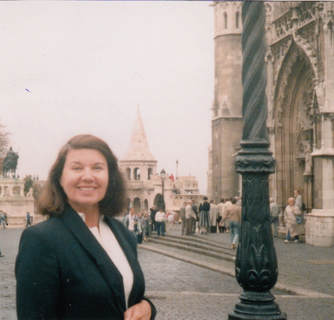 Sherrill in Budapest, Hungary
Sherrill in Budapest, Hungary In the fall of 1988, that may or may not have been true. We didn't know it, but the whole area was about to explode with the fireworks of change. Our exploration began with a flight on an ancient Balkan Airlines plane from Vienna to Rouse, Bulgaria. We were startled to see uniformed soldiers carrying huge guns in the Vienna airport. We'd never seen anything like that before in our 24 years of traveling together. The Balkan plane—its colors were green, red, and rust—took off at a terrifying angle, struggling to get into the air as quickly as possible. Once we were aloft, the two male flight attendants, both stretching the worn seams of their uniforms, thrust at each of the passengers a box lunch of bread and sliced salami white with fat. We survived both the flight and the lunch, but descending into Rouse was almost as alarming as taking off from Vienna had been—plus the runway had to have been made of broken cobblestones and pottery shards.
"I'll tell you the truth," the young Romanian guide began, as the bus headed toward Bucharest. "And answer your questions, but please no recording devices. You must understand that half of this country is spying on the other half and we never know for certain who belongs to which half."
We all nodded agreement, but before we got very far the antique Soviet-built bus broke down. The driver didn't seem upset about it. He just pulled out a magazine and stretched out to read it.
"I'll have to arrange for a new bus," the guide told us. "Excuse me."
We had no idea how he'd do that, since we were surrounded by scruffy-looking fields. However, he just walked back to a little green car that had been following us, talked with the two men in it, and they drove off to do something. When the second bus came to get us, the little green car was with it and stayed with us the rest of the day.
"Who lives there?" Sherrill asked.
"Around here, it's mostly Roma—gypsies." The guide glanced at the bus driver, as if he suddenly wasn't sure whether or not the man understood English. "They have a hard time. Also, the Nazis killed many of them—at least eleven thousand. They were taken away, along with the Jews."
We learned a little about the dictator Nicolae Ceausescu and his wife, Elena, who ran the country with him, but our guide obviously was trying to be discreet. Every time the bus stopped, for whatever reason, that little car also stopped behind us. In Bucharest, while we had lunch, it waited across the street from the restaurant.
"Do those two ever eat or go to the toilet?" Sherrill asked.
"Not when they're in the Secret Police," our guide told us.
"That's the Secret Police?"
We drove around the enormous "People's Palace" built by the Ceausescus. Third largest building in the world, by volume, the guide told us, with 3,000 rooms—its style seemed to be Early Wedding Cake. The center of old Bucharest was razed to make room for it. We never would have guessed that Bucharest once was called the Paris of the Balkans. Later, we dropped in at a service at one of the three Orthodox churches that were moved, instead of torn down, because they were considered historic. The rotund, bearded Orthodox priest smiled a lot at us after the service, showing his brown teeth, but either he knew no English or was afraid to be seen talking with us. Just a year later, as it turned out, central Bucharest was a battle zone. Nicolae and Elena Ceausescu fled, but were caught, tried, and shot on Christmas day 1989.
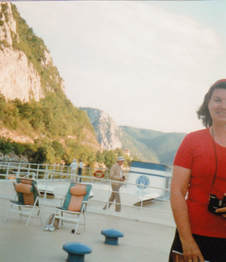 Sherrill & the Iron Gates on the Danube
Sherrill & the Iron Gates on the Danube Belgrade was almost as gray as Bucharest, but seemed to be starting to shake off its gloomy past. The stores were busy and actually full of merchandise. In a large bookstore, Sherrill found a bizarre, rather fascinating, and surprisingly cheap, copy of Alice's Adventures in Wonderland in Serbo-Croatian. Was it significant that in these countries held by ruthless dictators we often found translations of Lewis Carroll's tale of the innocent but clever child trying to outsmart the lunatic monarchs? Alice's Adventures in Wonderland and Through the Looking Glass were Sherrill's favorite books—which may have reflected her own view of the world.
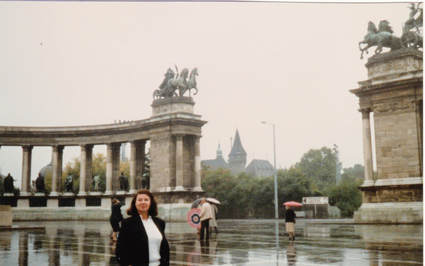 Sherrill, Memorial Square, Budapest
Sherrill, Memorial Square, Budapest "No better than we did in England."
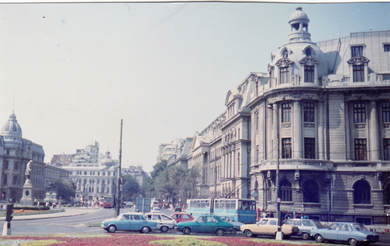
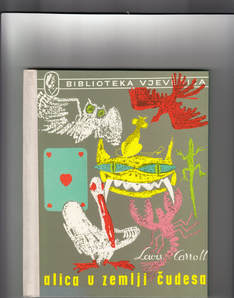
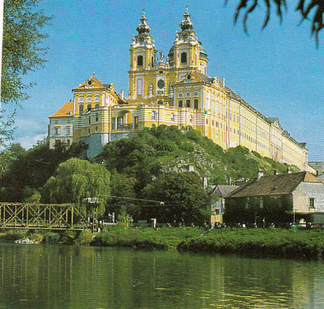
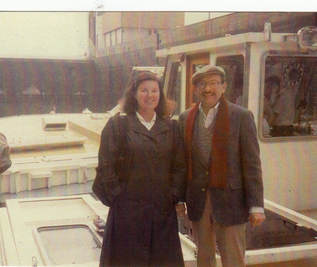
 RSS Feed
RSS Feed